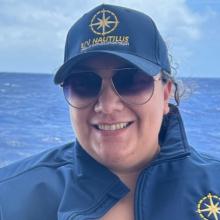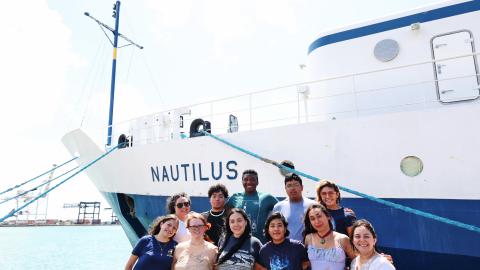
Jeanette Pirlo
Tell us about your work/ research. What kinds of things do you do?
I specialize in reconstructing ancient ecosystems through stable isotope geochemistry to develop food webs. I spend a large portion of my time in the field, searching for new fossils to better understand the past lives of ancient animals. From these fossil finds, I determine the interactions between the different species by analyzing the chemical composition of their teeth, comparing them to each other and looking for differences between the species which tells me the kinds of foods they ate. Alongside the paleo research, I spend a lot of time working to broaden representation in STEM fields by involving students in research, and authentic science activities. Many of my students are interested in translating their work into more accessible communication formats to better engage their communities.
Me especializo en la reconstrucción de ecosistemas antiguos usando la geoquímica de isótopos estables para desarrollar redes alimentarias. Paso gran parte de mi tiempo en el campo, buscando nuevos fósiles para comprender mejor las vidas pasadas de animales antiguos. A partir de estos hallazgos fósiles, determino las interacciones entre las diferentes especies analizando la composición química de sus dientes, comparándolos entre sí y buscando diferencias entre las especies. Esta información me dice los tipos de alimentos que comían. Además de la investigación paleontológica, dedico mucho tiempo trabajando para ampliar la representación en STEM involucrando a mis estudiantes en investigaciones y actividades científicas auténticas. Muchos de mis estudiantes están interesados en traducir su trabajo a formatos de comunicación más accesibles para involucrar más a sus comunidades.
What sparked your initial interest in your career?
If you were to ask me what my superpower would be, I would say being able to breathe underwater, like sharks. I was fascinated with the ocean and knew that delving into its mysteries would be my career. That is, until I found my first fossil, and then I was hooked on ancient life and how it could inform modern times. I began my journey as a paleontologist when I moved to Florida for graduate school, learning about geology and how our planet and oceans were formed. There is so much left to explore from ancient worlds to modern ecosystems.
Si me preguntaran cuál sería mi superpoder, diría que poder respirar bajo el agua, como los tiburones. De niña, he estado fascinada con el océano y sabía que estudiar sus misterios sería mi carrera. Hasta que encontré mi primer fósil, me enganché a la vida antigua y a cómo podían informar los tiempos modernos. Comencé mi viaje como paleontóloga cuando me mudé a la Florida para realizar mis estudios de posgrado, donde aprendí sobre geología y cómo se formo nuestro planeta y nuestros océanos. Queda mucho por explorar, desde mundos antiguos hasta ecosistemas modernos.
Who influenced you or encouraged you the most?
Although my parents did not have a former education, they always supported my academic pursuits. They did not understand my research, but they knew it made me happy and that I was engaging my community in understanding the world around them. In graduate school, I met mentors who were supportive of my research and career dreams and provided me with the tools necessary to achieve those dreams. Apart from their support, my mentors also spoke to my strengths and the skills I needed to further develop to continue on my path. My mentors were instrumental in my success, as they helped me see past my imposter syndrome and recognizing that I was competitive in my field.
Aunque mis padres no tuvieron la oportunidad a una educación, siempre apoyaron mis actividades académicas. No entienden muy bien mis investigaciones, pero saben que me hacen feliz y que puedo involucrar a mi comunidad en la comprensión del mundo que nos rodea. En la escuela de posgrado, conocí mentores que me apoyaron en mis sueños de investigación y carrera, brindándome las herramientas necesarias para lograr mis sueños. Además de su apoyo, mis mentores también hablaron de mis fortalezas y las habilidades que necesitaba desarrollar para continuar en mi camino. Mis mentores fueron fundamentales para mi éxito, ya que me ayudaron a ver más allá de mi síndrome de impostora y a reconocer que era competitiva en mi carrera.
What element of your work/ study do you think is the most fascinating?
The most fascinating portion of my work is that when I find a fossil, I am the very FIRST person to EVER hold this animal. This bone that has been hiding for millions of years is now available for us to better understand the world it lived in. The only portion of my work that is more exciting than finding a new fossil is taking students out into the field and seeing their joy and wonder in finding a fossil. Paleontology sparks the imagination, and seeing that spark in my students makes all the hard work to get to my position all the more worth it.
La parte más fascinante de mi trabajo es cuando encuentro un fósil, soy la PRIMERA persona en sostener este animal. Este hueso que ha estado escondido durante millones de años ahora está disponible para que podamos comprender mejor el mundo en el que vivió. La única parte de mi trabajo que es más emocionante que encontrar un nuevo fósil es llevar a mis estudiantes al campo y ver su alegría, y maravillarse al encontrar un fósil. La paleontología despierta la imaginación, y ver esa chispa en mis alumnos hace que todo el arduo trabajo para llegar a mi posición valga la pena.
How did you get involved with the Nautilus Exploration Program?
Applied for the STEMSeas program as a guest educator after learning about the program from Dr. Lisa White. We are excited to come onboard Nautilus for the program.
Apliqué por el programa STEMSeas como educadora invitada después de conocer el programa gracias a la Dra. Lisa White. Estoy entusiasmadas de regresar a Nautilus por el segundo año.
What other jobs led you to your current career?
I've traveled a unique path to my current position. I did not have the financial stability to volunteer for research opportunities during college and held several non-academic positions. The most formative experience was my time at the YMCA. I worked in various positions from child care, to camp counselor, to office supervisor. Working at the Y reinforced how much I enjoyed working with my community. I also worked in several customer service positions, teaching me patience, and excellent listening skills which are the basis of great mentoring skills which I use with my students. I also worked as a high school educator and academic peer counselor, working with a predominantly Spanish-speaking community and helping students formulate their post-high school plans. In the last year of my undergrad, I was able to squeeze in a couple of science-related experiences, exposing me to various fields of research and gaining new skills. I developed maps of islands that were under threat from invasive species; helped identify and dissect freshwater fishes from Africa; and worked with non-releasable marine mammals for research and education purposes. During the year between my undergraduate and graduate work, I was a research assistant at a natural history museum. I learned how museums and collections work, how fossils make their way from the field to display and research, and how to conduct research. All of the skills I gained from my unconventional path left me well-equipped to handle the rigors of a research and academic career. I understand how institutions of higher learning work, as they still operate like businesses. I developed and practiced the skills necessary to effectively mentor students through my various work experience and I developed diverse communication skills to disseminate my work to different audiences.
He recorrido un camino único para llegar a mi puesto. No tenía la estabilidad financiera para ser voluntaria en oportunidades de investigación durante la universidad y ocupé varios puestos afuera de la universidad. La experiencia más formativa fue mi tiempo en la YMCA. Trabajé en varios puestos, desde cuidado infantil hasta consejero de campamento y supervisor de oficina. Trabajar en la Y reforzó lo mucho que disfruté trabajando con mi comunidad. También trabajé en varios puestos de servicio al cliente, enseñándome paciencia y habilidades para escuchar, que son la base de excelentes habilidades de tutoría que utilizo con mis alumnos. También trabajé como educadora de secundaria y consejera académica de estudiantes, trabajando con una comunidad predominantemente hispana, ayudando a mis estudiantes a formular sus planes posteriores a la escuela secundaria. En el último año de mi licenciatura, pude aprovechar un par de experiencias relacionadas con la ciencia, lo que me expuso a varios campos de investigación y adquirí nuevas habilidades. Desarrollé mapas de islas amenazadas por especies invasoras; ayudé a identificar y diseccionar peces de agua dulce de África; y trabajé con mamíferos marinos con fines de investigación y educación. Durante el año transcurrido entre mis estudios de pregrado y posgrado, fui asistente de investigación en un museo de historia natural. Aprendí cómo funcionan los museos y las colecciones, cómo los fósiles salen del campo para exhibirse y ser investigados, y cómo realizar investigaciones. Todas las habilidades que adquirí en mi camino poco convencional me dejaron bien equipado para manejar los rigores de una carrera académica y de investigación. Entiendo cómo funcionan las instituciones de educación, ya que todavía operan como empresas. Desarrollé y practiqué las habilidades necesarias para orientar eficazmente a mis estudiantes a través de mis diversas experiencias laborales y desarrollé diversas habilidades de comunicación para difundir mi trabajo a diferentes audiencias.
What are your degrees and certifications?
PhD of Biology, concentration in Vertebrate Paleontology, University of Florida, 2022; Bachelor of Science in Marine Biology, University of California Santa Cruz, 2016; Associate of Science, Monterey Peninsula College, 2014
Doctorado en Biología, concentración en Paleontología de Vertebrados, Universidad de Florida, 2022; Licenciatura en Ciencias en Biología Marina, Universidad de California Santa Cruz, 2016; Asociado en Ciencias, Monterey Peninsula College, 2014
Me encanta levantar pesas, hacer senderismo en el campo, leer y tomar siestas. También disfruto desarrollando ficción sobre mi gato y las aventuras en las que se mete.
What are your hobbies?
I love weight-lifting, hiking, reading, and napping. I also enjoy developing fiction about my cat and the adventures he gets into.
Me encanta levantar pesas, hacer senderismo en el campo, leer y tomar siestas. También disfruto desarrollando ficción sobre mi gato y las aventuras en las que se mete.
What advice would you give someone who wants to have a career like yours?
Figure out what excites you the most about marine science, and pursue it. Take any opportunity that comes your way. Apply for everything because the worst thing that can happen is they'll say no, but what if they say yes?! Importantly, remember to ask for help. Reach out to the people that are doing the work that you are excited about and ask them how to get involved. Find good mentors, the ones that point out your strengths and support your dreams.
Descubre qué es lo que más te apasiona de las ciencias marinas y síguelo. Aprovecha cualquier oportunidad que se te presente. Solicita todo porque lo peor que puede pasar es que digan que no, pero ¿y si dicen que sí? Es importante recordar que debes pedir ayuda. Comuníquese con las personas que están haciendo el trabajo que te entusiasma y pregúntales cómo participar. Encuentra buenos mentores, aquellos que señalen tus fortalezas y apoyen tus sueños.
Expeditions
Jeanette participated in the following Ocean Exploration Trust expeditions:

